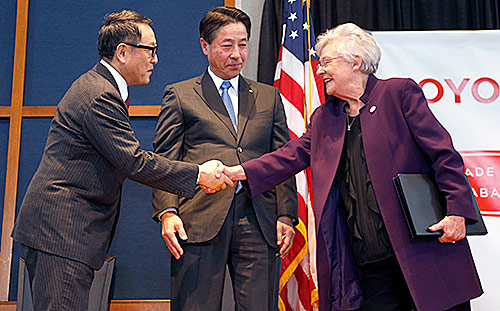Alabama Checked All the Boxes to Land $1.6B Toyota-Mazda Plant
By providing a large parcel of land ready for development, a skilled workforce, cooperative and responsive local resources, and competitive incentives, Alabama was able to land another high-profile auto manufacturer.
2018 Auto/Aero Site Guide

The site selection team involved in “Project New World” started off with a list of 300 potential site locations. After a nine-month search, the companies behind the project — Toyota and Mazda — selected Huntsville, Alabama, as the new home for their $1.6 billion factory.
How did Alabama land this coveted industrial prize?
For starters, experience helps. Alabama’s economic development team has been at the center of many large-scale recruitment projects dating back to Mercedes-Benz’s hunt for a U.S. manufacturing site in 1993. Since then, Alabama has worked with an all-star roster of automotive manufacturers: Honda, Hyundai, Toyota, and scores of global suppliers.
Preparation proved important. Officials in Huntsville and North Alabama had already secured a large parcel of land that was ready for development. When Toyota and Mazda came calling, they could point to a 2,000-acre site that could house a sprawling assembly plant, with a buffer zone that would allow it to fit in with the community. That was a key consideration for the automakers.
“By making this plant a vibrant part of that community, we hope to work, learn and grow together with the people of Huntsville and Alabama,” said Mazda Motor Corp. President and CEO Masamichi Kogai.
In a single generation, Alabama has become a powerhouse in the auto industry, and the Toyota-Mazda joint-venture manufacturing facility will provide another potent catalyst for sustained growth in the sector. Greg Canfield, secretary, Alabama Department of Commerce Naturally, workforce was a major factor in the decision. An advanced manufacturing facility can’t function without a skilled workforce. Over the years, Alabama has demonstrated that it can deliver engaged workers for auto manufacturing facilities. AIDT, the state’s job-training agency, will help assemble and train the 4,000-strong workforce for the Huntsville plant.
Toyota, which operates an engine plant in Huntsville with 1,400 employees, already knew about the Alabama worker. “Our investment to establish a new vehicle assembly plant with Mazda builds on the very success we have enjoyed in Alabama,” Toyota President Akio Toyoda said.
The Alabama team was also able to show the automakers that they could build a partnership together. The engineering teams at Toyota and Mazda had a long list of technical questions about the site. Because Huntsville officials had done their homework, they could provide answers. If they didn’t know the answer, they researched it quickly. The local utility and university were engaged and ready to help.
There were other factors in the decision, of course. Alabama provided a competitive incentives package, but it wasn’t the largest one on the table. In the end, the Toyota-Mazda partnership selected the site that met its detailed list of technical criteria and the state where it found a partner to help make its project a success.
“In a single generation, Alabama has become a powerhouse in the auto industry, and the Toyota-Mazda joint-venture manufacturing facility will provide another potent catalyst for sustained growth in the sector,” said Greg Canfield, secretary of the Alabama Department of Commerce.
Project Announcements
Eos Energy Enterprises Expands Allegheny County, Pennsylvania, Operations
11/01/2025
Ahold Delhaize USA Plans Burlington, North Carolina, Distribution Operations
11/01/2025
Ulbrich Specialty Wire Products Expands Westminster, South Carolina, Production Operation
11/01/2025
Alcoa Expands Massena, New York, Operations
11/01/2025
SmartWiz Expands Birmingham, Alabama, Headquarters Operations
11/01/2025
Dutch-Based Maars North America Plans Mount Pleasant, South Carolina, Production Operations
11/01/2025
Most Read
-
2025’s Top States for Business: How the Winners Are Outpacing the Rest
Q3 2025
-
The Compliance Reckoning Is Here
Q3 2025
-
Around the Horn: Data Center Supply Chains — What's Next?
Q3 2025
-
How Consumer Trends Are Reshaping Food Facilities
Q3 2025
-
Powering the Next Generation of Projects
Q3 2025
-
First Person: Filter King’s Expansion Playbook
Q3 2025
-
Rethinking Auto Site Strategy in the Age of Tariffs and Powertrain Shifts
Q3 2025